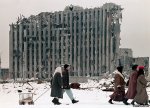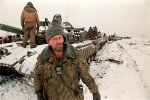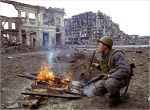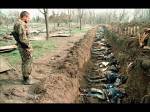Russian Response to the Chechen Declaration of Statehood: Subsequent First Chechen War
Tensions between the Russian government and the declared independent republic were reignited following numerous bus hijackings, and subsequently escalated into warfare in late 1994, amounting to Russian defeat and de facto independence for the Chechens. Beginning purely as a political tussle between Moscow and Grozny in 1991, this conflict turned into a savage war in 1994-96, reducing Grozny to rubble. The catalyst for the Russian government’s renewed pressure on Dudayev was the series of 4 bus hijackings by Chechen criminals in the North Caucasus. Former mentioned professor, P.L Dash, describes the dilemma Yeltsin faced – whether or not to attack Chechnya, in his article published during the war in 1995;
“The fears of separatism spreading from Chechnya to other non-Russian regions, the strategic interests of Russia in the Caucasian southern rim, the economic factors … and salvaging Yeltsin’s own plummeting popularity were major factors responsible for Russia’s entanglement in Chechnya … The fears of acting liberal, as Gorbachev did under Perestroika, might have precipitated impending dismemberment of Russia.” (Dash:1995:pg.369)
The Western perspective towards the chaotic outbreak of armed struggle in the First Chechen war is reflected in Time Magazine journalist, George Church’s article; ‘Death Trap’. Published during the conflict itself in 1995, now almost 20 years ago, Church discusses various aspects of the war; the David and Goliath nature of the conflict, and the unlikely resolution of the hostility between the two parties.
“Most outsiders felt instinctive sympathy for the Chechens as the victims of assault –– but sympathy too for the hapless Russian recruits dying because of the ineptitude of their leaders and generals … A few voices call for letting regions historically forced into the Russian Federation to go free … But the US and West European nations acknowledged without question Russia’s right to hold the country together… The Chechen war is one of those terrible problems for which a happy outcome seems almost inconceivable and a descent into more bloodshed, chaos and dictatorship all too likely.” (Church:1995:Online)
Read full transcript of the 1995 Time Magazine article
Harrowing Images of the First Chechen War:
- Russian Tanks Moving Towards Grozny
- Remnants of the Chechen Presidential Palace in the Aftermath of the First Chechen War
- Russian Soldiers
- Troops in Grozny
- Chechen Rebels dwelling in the Rubble of Grozny
- Mass Grave of Chechen Civilians –– Tens of Thousands killed during the war
- Chechen Forces
- Grozny Reduced to Rubble
Unfortunately for the Russians, poorly prepared and appallingly executed troops amounted to Russian defeat, and the war’s failure presented the Kremlin with a difficult choice between a humiliating defeat and subsequent retreat or further military intervention. On the whole, the First Chechen war, lowered Yeltsin’s popularity further, a development that alarmingly threatened his position in the 1996 presidential elections. As Yeltsin’s army in Chechnya became demoralised and deprived of incentives to fight on as a result of his political manoeuvring, the rebels were quick to seize their chance and entered Grozny in August 1996. Formally sealing the final defeat of the federal forces, on August 31 1996, Russian military commander Aslan Maskhadov signed a cease fire agreement, allowing Chechnya’s declared independence to prevail. However, the Chechen victory failed to resolve the conflict, as Warlordism, Islamic radicalism and anarchy reigned in Chechnya for about three years, seriously affecting Russian politics and society –– leading to a renewed cycle of conflict.
Footage of the First Chechen War: Combat in Grozny
De Facto Independence of Chechnya and Resulting Second Chechen War







